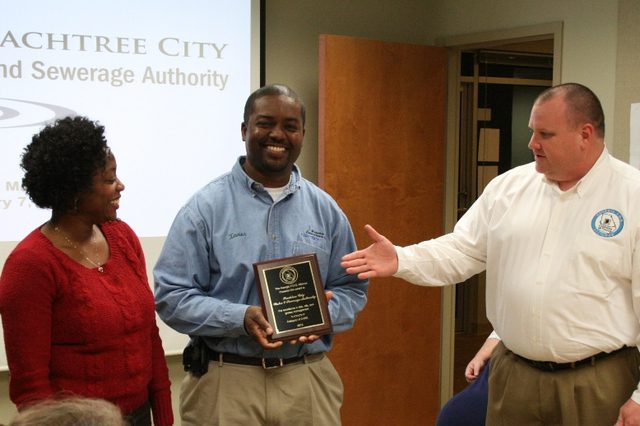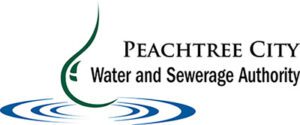Feb 15, 2013 by Dr. Chris Wood

(Left to Right) PCWASA Division Manager Keisha Lisbon Thorpe and FOG Program Coordinator Xavier Davis receive the statewide Award of Excellence for FOG (fats, oils, and grease) Programs from the Georgia F.O.G. Alliance’s President Doug White.
In its Report to Congress on combined sewer overflows (CSOs) and sanitary sewer overflow (SSOs), the U.S. Environmental Protection Agency (EPA) noted that the most common cause is “grease from restaurants, homes, and industrial sources.” The conservative EPA estimate is that 47% of all sewer system blockages are caused by grease.
To combat this nationwide environmental protection issue, the Peachtree City Water and Sewerage Authority (PCWASA) has a FOG (fats, oils and grease) Program in place and personnel on staff to implement strategies that target residential, commercial, and industrial customers to seek their assistance in preventing sewer line clogs within their properties and subsequent backups within the Authority’s sewer system. Sewer overflows from fats, oils, and grease also are potentially harmful to the environment, note Authority officials.
As a result of the Authority’s efforts in this regard, the FOG Program at PCWASA has received high praise from the Georgia F.O.G. Alliance, who presented an Award of Excellence for one of the state’s most outstanding programs to the sewer utility during the January Authority Board Meeting.
Doug White, President of the Georgia F.O.G. Alliance this year and himself a Construction Project Manager and FOG Inspector for the City of Griffin, presented the Award of Excellence in FOG programming to the Authority’s Xavier Davis, FOG Program Coordinator for PCWASA, and Keisha Lisbon Thorpe, PCWASA Division Manager of Technical Services, which is the Authority’s division that oversees its FOG Program.
The purpose of the PCWASA fats, oils, and grease (FOG) Program is to assist in the prevention of sanitary sewer backups and overflows from occurring within the Authority’s wastewater collection system and treatment facilities by managing residential, commercial, and industrial generated FOG. Davis, as the Authority’s FOG Program Coordinator, implements those management strategies. He does so by following an industry approved process, which has now received recognition as a program of excellence, entailing plan review, installation approval, and inspection of grease traps and grease interceptors used by commercial and industrial clients.
Through these efforts, Davis and the Authority assure that commercial and industrial PCWASA customers such as restaurants, schools, hair salons, pet grooming salons, and others, have grease traps and/or grease interceptors that are in compliance with the Authority’s Sewer Use Ordinance, which is in place to prevent FOG from negatively impacting the conveyance or treatment of sanitary sewer.
As for involving PCWASA residential customers in FOG prevention, Davis and the Authority continually educate this target audience on methods and practices for properly disposing of fats, oils, and grease within residences, and thus reducing or preventing them from entering the PCWASA wastewater collection system.
Rather than pouring grease down the drain, PCWASA officials encourage Peachtree City residents and property owners to let grease cool, pour it into a can or container, and dispose of it in the trash. The Authority even has reusable grease can covers available at its headquarters for free to aid PCWASA customers in this process.
For more information, citizens can contact the Authority’s Xavier Davis at 770-487-7993, or at xavierd@pcwasa.org.
Media contact:
Chris Wood, Ph.D.
770-757-1681 (phone)
jcwood@uga.edu (email)

